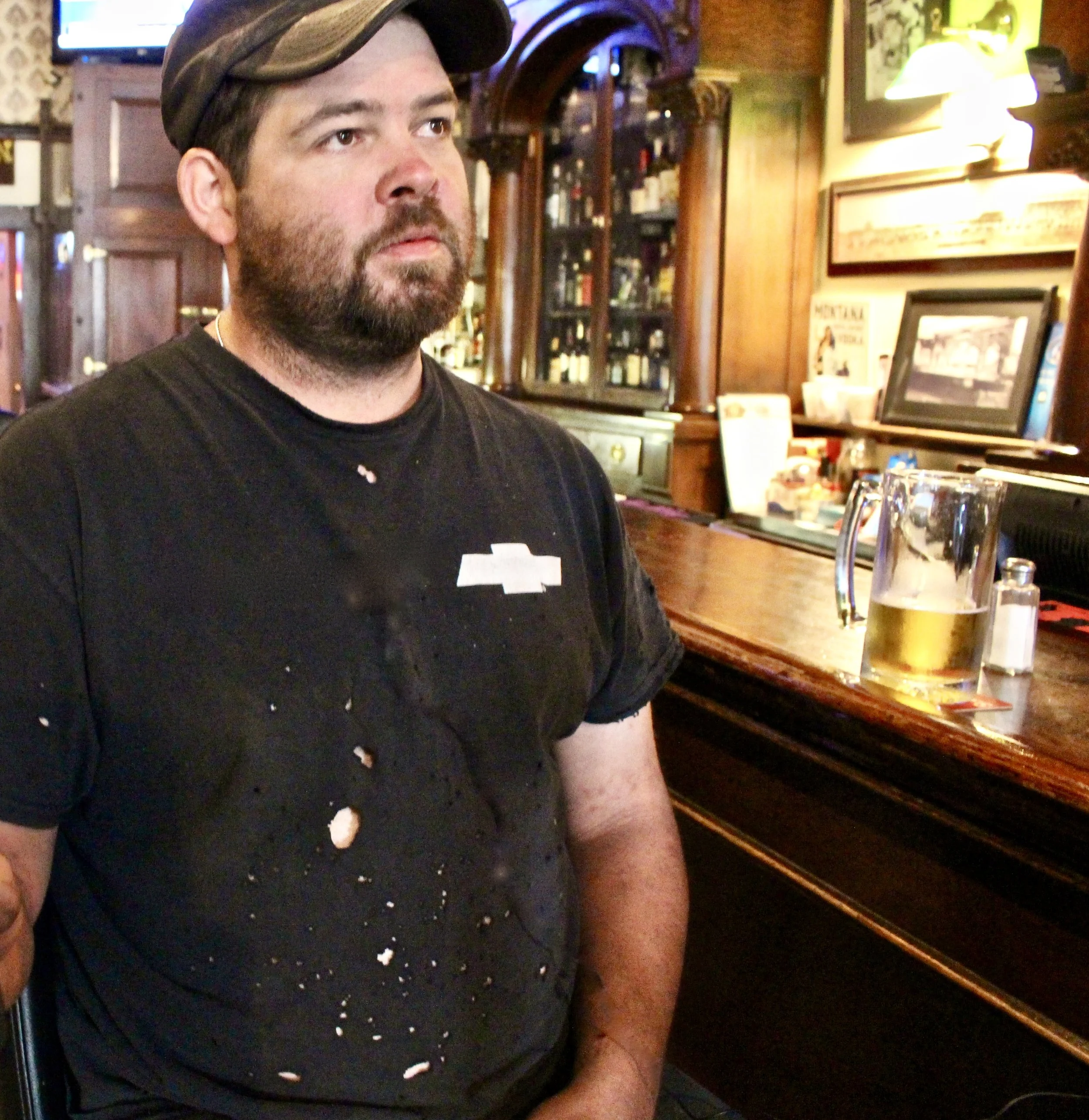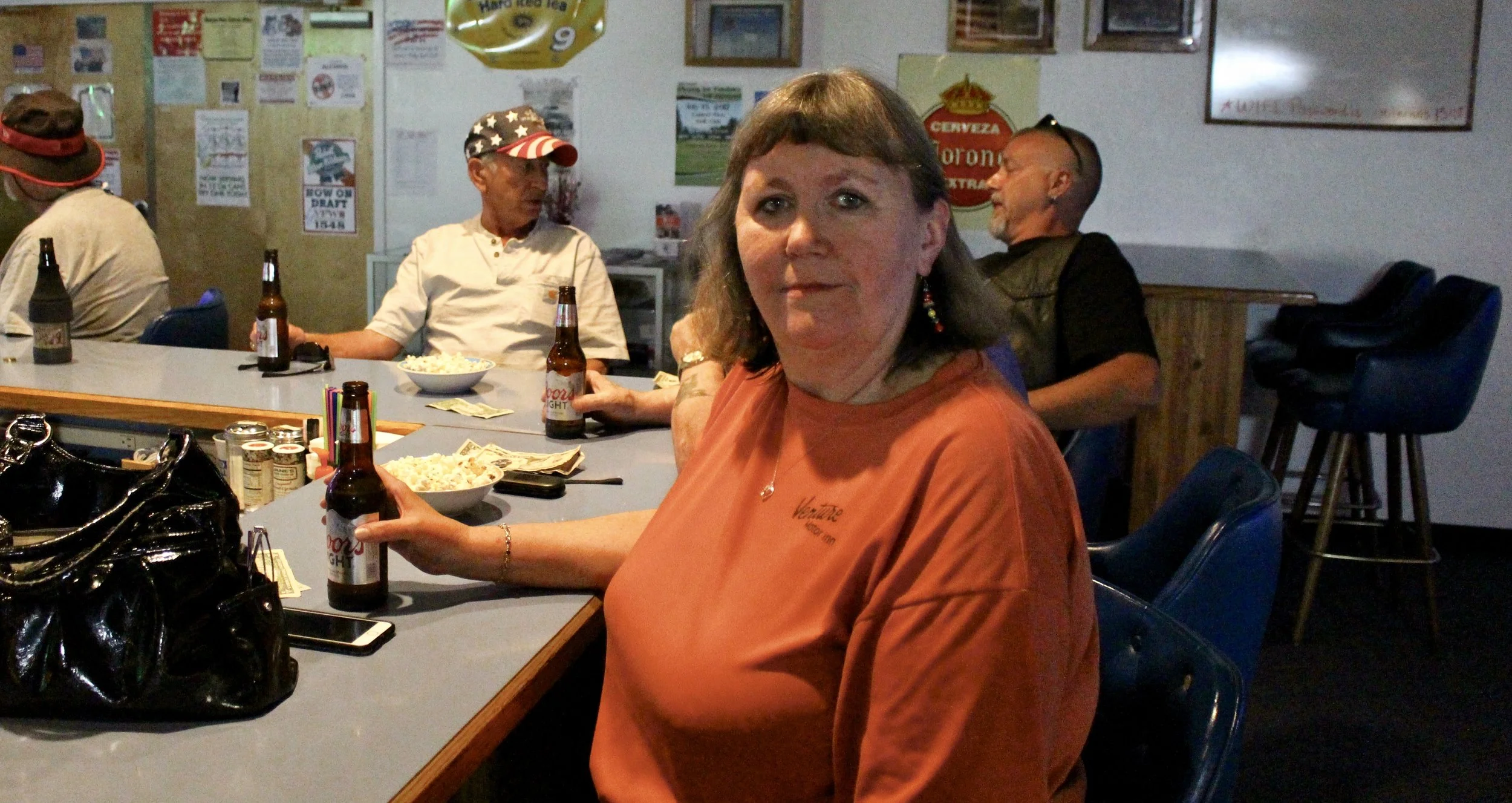The Welder
The Montana Bar's bright signs demand attention on Main St.
The Montana Bar is a town anchor plopped on Main St. Miles City, next to the Bison Bar, across from the Trails Inn Bar all with their colorful neon humming a welcoming tune. The locals have appointed hours when they haunt the bar stools. Many of them have spent time behind the bar as well. Miles City is a town of only a few major industries: agriculture, mechanics, service; and it’s a place where people can and do just about every job at one point or another.
Scott Fogel swings by the bar around 2:30 most days after his shift welding at the local train shop. The bartender is his high school classmate. He worked as a bartender at the Montana and Bison bars. He’s one of the jacks of all trades that make Miles City so close to self-sufficient and resilient. Of course, Scott grew up about an hour out of town in Jordan. He claims this town of 8,500 is just about as big as he can handle and looks longingly to the rural towns on the outskirts of this railroad hub. The country is still home for him.
“Jordan is a neat little town, everyone knows everyone. If I could find something to do up there, I’d be back there in a heartbeat. I think growing up in town sucks. In the country you’re not around people; I’d disappear for hours even when I was a little kid. I’d just go walk the hills and show back up sometime.
We moved here when I was halfway through first grade. Dad got a job at the railcar repair place, TransCo. Then he took a job on the trains for Burlington. We didn’t see him much during those times. It was worse than truck driving, he’d get home at 10:00 at night and leave at 4:30 in the morning because he’d have to drive all the way to Forsythe to get on a train. We didn’t see him very much for years. But he quit that and sorta day-worked as a cowboy until he went into the tree business. Done that for 20 years or so. Now he just kinda does what he needs to go fishing and hunting. ”
Scott's hat proudly boasts his hometown
Scott spoke of a life largely hung on the actions of his family and personal choices. He told of his freedom to run off and ride around, his time trying to get a Shetland pony to be anything other than unhelpful and stubborn, his time at parties and hanging around his grandfather's machine shop. Childhood life in his memory is self-reliant, self-contained and carefree. With a major exception.
“Riding horses was one of my favorite things to do. I mostly rode with Dad, working cows, but that ended when I was 16. I broke a hip skiing in 1996 and that doctor in Billings put it back together right, but that fall I broke the other hip riding steers and the doctor here didn’t put it back together right.
Everything seemed to be fine and we were going to brand calves one day and we brought all the wrestlers out and Dad said “hop on and go rope.” I knew as soon as I put my foot in the stirrup and went to swing on him that it wasn’t gonna work. I sat down and one leg is out straight, the other one sitting normal on the side. So I picked myself up and shoved both feet in the stirrups and then my ass was a foot off the saddle. I couldn’t sit down. Dad said “what the hell are you doing” I said, “I can’t sit!” Dad went off and called the hospital. If it wasn’t for my stepmother I think we’d both still be in prison because we we’re gonna kill the guy.
We tried for months hoping maybe it would just stretch out or something. I rode for half a day once and I just couldn’t walk for a week after that. I looked like an 80 year old man. I told Dad “I kinda gotta hang this up.” And that sucked because when we were mad at each other that’s what we’d do. We’d saddle up and ride and hash our shit out and everything would be fine. Once that was gone it got a bit hard between us because we didn’t have that anymore, we’d both just be mad.”
Scott’s distaste for doctors has continued, and not with lack of reason. His limited exposure to hospitals and care have done little to inspire confidence.
Salting beer is a tradition here
“The Monday after Bucking Horse, we’re cleaning up the bar and a prairie dog comes waltzing in. We all tried to stomp him, there was about 4-5 of us dancing around like idiots trying to get it stomped before it bites someone. He got underneath that cooler and I figured I could grab him by the scruff of the neck. I missed and he spun around bit me right on the pad of my hand. So I was bleeding like an SOB.
I went back and dumped a bunch of gin on it but I was still bleeding. They made me go to the hospital and I walk in saying I got a prairie dog bite that I need wrapped and treated. Nurse looks at me and says that for any dog bite we’ve got to go and call the owners and file a certain type of claim. I looked at her dumbfounded for a second and told her again it was a prairie dog bite. She said it doesn’t matter what type of dog it is, that’s the process. The stupid nurse there didn’t know what a prairie dog was. So I said if you don’t know what a prairie dog is, you’re not sticking shit in me. And I walked out.”
His experience is not uncommon in the area. Moments like these are often the root of people’s distaste for the far-off bureaucracy of healthcare, government, regulation. This far off from the source, they often come in ham-handed and do more harm than good. Or at the very least, their process seems to run a textbook case of how not to inspire trust. Perhaps because of his friction with the formal institutions of care, he understands and advocates the need to be cared for and care for people.
“It feels like the main responsibilities we have are paying bills and making sure everyone else is doing alright. I always try to throw my shit aside and help everybody else and I deal with my own shit on my own time. It goes back to all this funeral stuff we’ve had going on recently. I’ve had a lot to deal with recently but what’s important to me is taking care of everyone else first, my dad, my sister, my grandma. They all have a lot of weight on them with my Mom and Grandpa passing. I try to take care of them, make sure they have someone there for them. That’s how I try to live my life.
Or for example, one of our neighbors had a problem with their plumbing and I offered to take a look at it and it was way beyond me, mostly because it was in a crawlspace and I’m claustrophobic. So I said you’ll have to call a plumber to get it fixed but it was a Saturday and no plumber was going to get anywhere near there till Monday. The woman had a little kid and they weren’t going to be able to shower or use the toilet or anything like that. She was strapped for cash though so I scrounged up the money to put them up in a motel for a couple nights. I ended up getting pissed because she never had the decency to say thanks but that was all I’m ever really looking for is a thanks. I don’t want people to pay me or anything like that. Just say thanks and maybe be there for me if I’m ever in trouble myself.”
Caring for each other is probably what kept the town from becoming like the ghost towns on the highway on the way there. This part of Montana is close enough to oil that many of the towns along the drive are closed or diminished. The most recent declines are due mostly to the global oil glut that keeps prices well below production costs in expensive-to-drill shale fields.
“We got a good bit of money from trickle down when the Bakken Shale was running. It affected us but we’re far enough away from it that when it all came down, the town was able to survive it. When Sanjel closed down, a lot of people lost their jobs though”
Sanjel was an oil field services company that employed more than 200 people in Miles city back in 2015. Its closure was like the many closures at the time, brutal for small towns around Montana whose economies often become fully attached to the fortunes of single industries or even single companies. In Miles City’s case the damage was limited by the diversity of industry available to people there. They could always rely on agriculture. But without this supplement, the town’s fortunes depend heavily on the irregular luck of farming and ranching money.
“Most of the state is agriculture based. There’s some industry and some oil and stuff. Farming and ranching. Everyone around here is in farming and ranching. There are people that work in banks and stuff around here but all the money is generated by agriculture. This year sucks though. We need some rain, well it’s too late now. Nobody’s gonna be able to make any hay. Most people are haying their wheat crops or grazing it. It’s kinda turned into a shitty year. It’s too dry.”
Hay bales sit in dry fields
All things considered it seems an easy thing to understand why towns like this want to leave and be left alone by outsiders. People coming through are welcomed warmly as friends but people are wary of being told what to do by institutions outside their sphere and outside their control. The feeling has roots even back to the beginning of the town.
“There’s actually a funny story for how this place got its name. There was a general, Nelson Miles was his name, and his soldiers always wanted to come into town for drinks or to go whoring, and he hated the town for that. He was always trying to forbid his soldiers from coming in town. So all the townspeople got together and renamed the town Miles City just to piss him off.”










